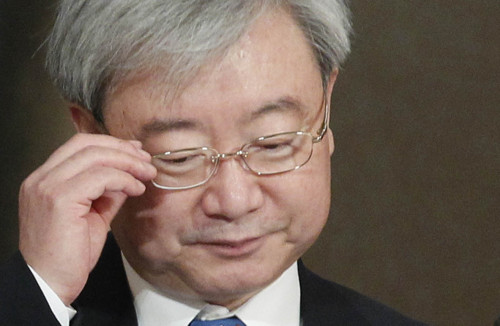Expert says top regulator has bigger responsibility as decision-maker
The Financial Services Commission has remained silent about the recent woes of its executive arm ― the Financial Supervisory Service, which is facing tough public criticism due to irregularities.
The irregularities include allegations that several FSS staffers took kickbacks from debt-ridden savings banks and the regulator’s failure in oversight of the secondary banking sector.
Though the FSS has apologized publicly and promised to conduct a sweeping reform of its staffing structure, the final decision-maker FSC is hesitating to comment on the issue.
It is the FSC that sets supervision policies and fine-tunes sanctions against financial companies for their wrongdoings.
In the same vein, it was FSC Chairman Kim Seok-dong who initiated restructuring of the secondary banking industry by suspending operations of eight savings banks right after taking office last January.
The irregularities were conducted several days before the financially distressed Busan Savings Bank was halted its operations.
 |
Kim Seok-dong |
The FSC failed to prevent its internal information on its planned sanction of business suspension from being leaked. As a result, VIP customers, reportedly including major shareholders of the savings bank, withdrew their deposits several days (or one day) before the suspension.
While a large portion of the public still confuses the FSS and the FSC, Hansung University economics prof. Kim Sang-jo said the biggest responsibility for the troubled savings banking sector lies in the latter.
“The FSC has abused its regulatory power. But it shifts responsibility on the FSS whenever problems hit the market,” Kim said in his contribution articles to an online news service provider.
“Though there is no evidence, I believe the FSC has also made the FSS the scapegoat for the recent incident,” he said.
The professor also criticized a group of top-ranking officials who had worked for the Finance Ministry for decades.
“During the parliamentary hearing on the financial authorities about problems of savings banks last month, former finance ministry officials including incumbent FSC chairman Kim Seok-dong and former FSC chairman Lee Hun-jai, trying to evade their responsibility,” he said.
Further, incumbent FSS Governor Kwon Hyouk-se also had mostly served for the Finance Ministry and was vice chairman of the FSC before he was appointed to the FSS top post.
Meanwhile, a local banker argued that the FSC is still far from meeting the global standards. He criticized the regulator for pressuring major financial groups to take over bad assets of ailing savings banks.
“Though the FSC said the move is to prevent the savings bank crisis to affecting the whole market, I don’t think failure of several secondary banks would affect the economy seriously,” he said. “Ironically, the government does not mind small- and mid-sized enterprises going under.”
Even an FSS official expressed misgivings about driving financial groups into rescuing troubled savings banks.
“It is undeniable that asset soundness and brand image of financial groups could be undermined with the acquisition of the secondary banks,” he said.
“It seems that several financial groups have agreed to the takeover scheme against their will,” said a senior official of a major commercial bank.
He said Korean regulators should stop twisting the arms of commercial banks.
“In case of Citigroup, U.S. regulators instructed the financial group not to increase its asset scale any more for the sake of its financial health.”
On the contrary, an FSC official said the policy is the best currently available option to secure market stabilization.
By Kim Yon-se (
kys@heraldcorp.com)








![[Herald Interview] How Gopizza got big in India](http://res.heraldm.com/phpwas/restmb_idxmake.php?idx=644&simg=/content/image/2024/11/20/20241120050057_0.jpg)